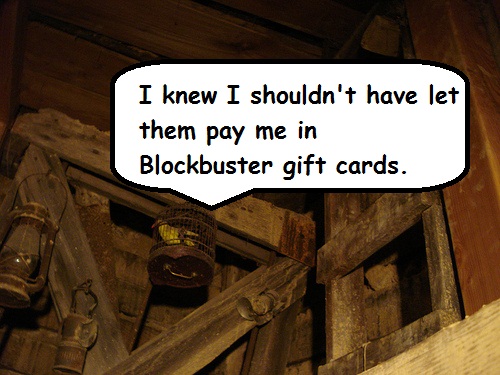
underlying image courtesy TheBridgemaker.com
I was in New York yesterday visiting a friend who just moved to the area. During a tour of his neighborhood, we stopped to see if there were any good deals at a Blockbuster Video that was closing. It sparked a discussion of Blockbuster’s business model and why they were struggling for survival.
My friend was surprised to hear that Blockbuster may end up in bankruptcy, and he commented that it seemed like they had kept up well against Netflix with their online DVD rental service. I pointed out that it had turned out to be a case of “too little, too late”, as most of their customers who would have been interested had already switched to Netflix. Plus, Blockbuster was stuck between a rock and a hard place; encourage your customers to move to an all-you-can-eat mail order, and you’re driving people away from your retail stores. Spend too much time focused on the retail stores, and you run the risk of losing out on future trends.
Blockbuster is still trying (and potentially failing) to figure out this balance, but they aren’t the only retailers or even industry in this situation. Bookstores are walking the same thin line. If B&N and Borders DON’T spend time training their customers to become ebook customers, there’s a good chance someone else, like Amazon or Apple, may swoop in and steal them away. But if they spend all their time developing new ebook strategies at the expense of the existing retail ones, they’ll stagnate their current growth and possibly lose out anyway.
Newspapers are in a similar bind. Everyone is predicting the death of newspapers, and many papers have moved to online-only circulation, while others have created paywalls where full access requires a paid subscription. Still, there’s plenty of readers who are “old school” and prefer their newspapers in paper form (trust me, you should see the pile of Wall Street Journals and New York Times that get delivered to my office each morning). So again, how do you bridge the consumers who are turning to a new form of media while still trying to keep the existing business model going?
I don’t have any answers, but I do think it’s an interesting parallel between Blockbuster and traditional publishing in the struggle for their futures. Much like publishing, Blockbuster had a great business model for a physical media world, but it was unable to move fast enough or be limber enough to balance the old and the new. Hopefully, it isn’t a sign of where bookstores and newspapers may be headed, and that Blockbuster will simply be an unfortunate victim of the digital world, and not a canary in the coal mine for the printed word!